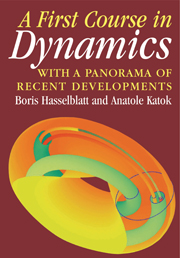1 - Introduction
Published online by Cambridge University Press: 05 June 2012
Summary
This chapter is a prelude to this book. It first describes in general terms what the discipline of dynamical systems is about. The following sections contain a large number of examples. Some of the problems treated later in the book appear here for the first time.
DYNAMICS
What is a dynamical system? It is dynamical, something happens, something changes over time. How do things change in nature? Galileo Galilei and Isaac Newton were key players in a revolution whose central tenet is Nature obeys unchanging laws that mathematics can describe. Things behave and evolve in a way determined by fixed rules. The prehistory of dynamics as we know it is the development of the laws of mechanics, the pursuit of exact science, and the full development of classical and celestial mechanics. The Newtonian revolution lies in the fact that the principles of nature can be expressed in terms of mathematics, and physical events can be predicted and designed with mathematical certainty. After mechanics, electricity, magnetism, and thermodynamics, other natural sciences followed suit, and in the social sciences quantitative deterministic descriptions also have taken a hold.
Determinism Versus Predictability
The key word is determinism: Nature obeys unchanging laws. The regularity of celestial motions has been the primary example of order in nature forever:
God said, let there be lights in the firmament of the heavens to divide the day from the night and let them be for signs and for seasons and for days and years.
Information
- Type
- Chapter
- Information
- A First Course in Dynamicswith a Panorama of Recent Developments, pp. 1 - 28Publisher: Cambridge University PressPrint publication year: 2003
